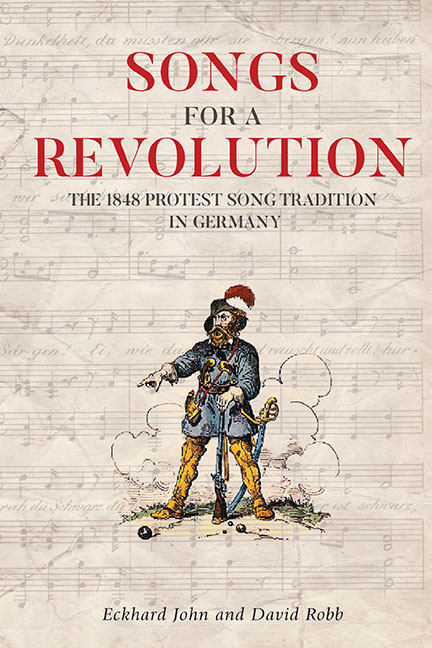Book contents
- Frontmatter
- Contents
- Preface
- Introduction: The Emergence of Political Song 1830–48
- Part I Before 1848: The Vormärz
- Part II 1848–49
- Part III 1848 in Memory
- Conclusion: The Making of Tradition; The Protest Songs of 1848 in the German Folk Revival 303
- Bibliography
- Discography
- Index of Names and Terms
- Index of Song Titles
10 - “Hecker! hoch Dein Name schalle”
Published online by Cambridge University Press: 23 October 2020
- Frontmatter
- Contents
- Preface
- Introduction: The Emergence of Political Song 1830–48
- Part I Before 1848: The Vormärz
- Part II 1848–49
- Part III 1848 in Memory
- Conclusion: The Making of Tradition; The Protest Songs of 1848 in the German Folk Revival 303
- Bibliography
- Discography
- Index of Names and Terms
- Index of Song Titles
Summary
“HECKER! HOCH DEIN NAME SCHALLE” (Hecker! May Your Name Resound) is a political song from the year 1848. It was written by the Mannheim typesetter Heinrich Sulzer in tribute to Friedrich Hecker, the leader of the Baden uprising of April 1848. The song immediately enjoyed rapid circulation and was the best-known musical homage to the exiled freedom fighter in the years of revolution. Its introductory words “Hecker hoch!” became a familiar slogan in the republican movement. Unlike other Hecker songs, however, this one quickly lost its significance after the failure of the revolution, and by the close of the nineteenth century it was primarily perceived as a historical song. In the twentieth century its reception was mostly confined to publications in which it was quoted as a characteristic portrayal of the atmosphere of 1848. In the 1848 repertoires of folk and the Liedermacher acts of the 1970s the song played no active role.
“Hecker! hoch Dein Name schalle” originated in the wake of Friedrich Hecker's uprising attempt in Baden and his flight to Switzerland following the military defeat of April 20, 1848. The first dated publication of the song was in June 1848 in Mannheim, where its author Heinrich August Sulzer (1818–83) worked as a typesetter in the printing trade and was an activist in the democratic movement. It is possible that Sulzer published the song for the occasion of the National Book Printer Gathering, the first ever national get-together of trade workers, which took place in Mainz from June 11–14, 1848, and which he attended as a delegate. Sulzer had lived in Mannheim since 1844, the town where Friedrich Hecker had worked since 1838 as an lawyer, while simultaneously making his name as an oppositional politician on the local council, as well as in Baden’s Second Chamber. Sulzer's text literally constitutes a hymn-like veneration of the radical spokesman, an attribute shared by other Hecker songs he wrote in 1848, such as “Der größte Name” (The Greatest Name). This began with the words: “Kennt ihr den Namen, den, kaum geboren, lallend mit Freude das Kind schon besingt?”
- Type
- Chapter
- Information
- Songs for a RevolutionThe 1848 Protest Song Tradition in Germany, pp. 147 - 159Publisher: Boydell & BrewerPrint publication year: 2020



